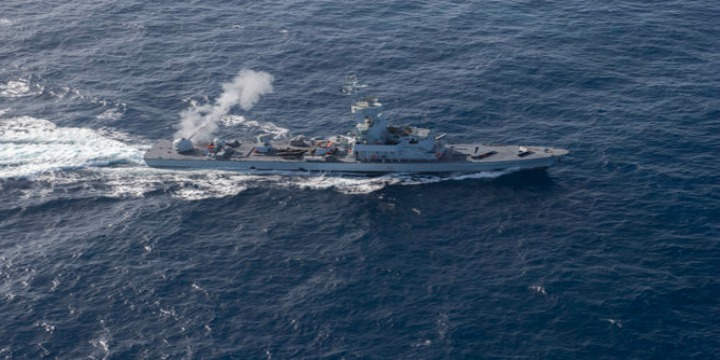Expert: ‘Informal Coalition’ Including Israel to Face Down Iran Over Red Sea Straits Is Possible
 by Benjamin Kerstein
by Benjamin Kerstein

An Israeli Navy ship. Photo: IDF.
Israel could well take part in an “informal coalition” to confront Iran over a strategic waterway on the Red Sea, an expert told The Algemeiner on Thursday.
Israeli Prime Minister Benjamin Netanyahu mentioned such a coalition on Wednesday following an attack on Saudi oil tankers sailing through the strategic Bab-el-Mandeb straits at the mouth of the Red Sea.
“At the beginning of the week we were witness to a sharp clash between Iran’s proxies that tried to sabotage international shipping in the strait at the mouth of the Red Sea,” Netanyahu said.
“If Iran tries to block the Bab-el-Mandeb waterway,” he added. “I am convinced that it will find itself against an international coalition determined to prevent that. This coalition will include the State of Israel and all of its branches.”
Michael Makovsky — the president of the Jewish Institute for National Security of America (JINSA) — told The Algemeiner that he was “struck” by Netanyahu’s statement.
“It was unusual,” he said.
Nonetheless, he stated, Israel has a definite strategic interest in denying Iran the waterway. “The Israelis, they have obvious interest in the free flow of shipping there in their own economic interest,” Makovsky noted. “In addition, they’re interested in that area for Iranian weapons that have flowed that way. And in general anything having to do with Iran in the region they’re very keen on.”
Moreover, the straits’ proximity to Yemen, where Iran-backed militas are involved in a civil war with a Saudi-backed Arab coalition, makes it strategically important to Israel. On a recent visit to the Jewish state, Makovsky said, “Yemen does come up. The Israelis are definitely interested. The Iranians are there, Hezbollah’s there, it affects their sea lanes, and obviously the Israelis are keen on wherever the Iranians are in the region.”
The question of Israeli military action, however, alone or as part of a coalition, is very far off. Netanyahu, Makovsky said, was probably “just trying to make a point. It’s not as if Israel is going to lead such a coalition. If there was such a coalition Israel certainly could be helpful, such as in intelligence and maybe in a few other ways. The United States would really have to take the lead in that.”
“I don’t know how serious it is, because there is no coalition that I’m aware of that exists right now. I think Netanyahu is just trying to signal the Iranians, that’s all. And he might be also trying to signal the Saudis that Israel could be also helpful to them in some of their issues. And they can be,” he added.
Historically, Israel has been excluded from regional coalitions due to Arab opposition. Asked whether this would be the case on the Bab-el-Mandeb issue, Markovsky replied, “It’s a good question. There’s an opportunity here for Israel to work with these Gulf countries in a regional coalition. The US would have to be the lead, obviously. The Israelis would be helpful in any US action, it could work well there, so you can envision an informal coalition where Israel is helpful to the United States and therefore helpful to the Saudis.”
He described such a coalition as “like a hub with the spokes” with the US at the center and Israel and the Arab states branching off separately.
 Iran Sentences Rapper Toomaj Salehi to Death Over 2022-23 Unrest
Iran Sentences Rapper Toomaj Salehi to Death Over 2022-23 Unrest Netanyahu: ‘Antisemitic Mobs Have Taken Over Leading U.S. Universities’
Netanyahu: ‘Antisemitic Mobs Have Taken Over Leading U.S. Universities’ U.S. Decides Against Sanctions on IDF’s Netzah Yehuda Battalion
U.S. Decides Against Sanctions on IDF’s Netzah Yehuda Battalion Israel Says It Is Poised to Move on Rafah
Israel Says It Is Poised to Move on Rafah Israeli Hostage Hersh Goldberg-Polin Seen Alive in a New Hamas Video
Israeli Hostage Hersh Goldberg-Polin Seen Alive in a New Hamas Video Palestinian Prime Minister Announces New Reform Package
Palestinian Prime Minister Announces New Reform Package France: Man Suspected of Abducting, Raping Jewish Woman ‘to Avenge Palestine’
France: Man Suspected of Abducting, Raping Jewish Woman ‘to Avenge Palestine’ Israel Intensifies Strikes Across Gaza, Orders New Evacuations in North
Israel Intensifies Strikes Across Gaza, Orders New Evacuations in North Iran Threatens to Annihilate Israel Should It Launch a Major Attack
Iran Threatens to Annihilate Israel Should It Launch a Major Attack ‘Completely Baseless’: Reports of Mass Graves at Gaza Hospitals are False, IDF Says
‘Completely Baseless’: Reports of Mass Graves at Gaza Hospitals are False, IDF Says



 Israeli Hostage Hersh Goldberg-Polin Seen Alive in a New Hamas Video
Israeli Hostage Hersh Goldberg-Polin Seen Alive in a New Hamas Video Israel Says It Is Poised to Move on Rafah
Israel Says It Is Poised to Move on Rafah U.S. Decides Against Sanctions on IDF’s Netzah Yehuda Battalion
U.S. Decides Against Sanctions on IDF’s Netzah Yehuda Battalion Netanyahu: ‘Antisemitic Mobs Have Taken Over Leading U.S. Universities’
Netanyahu: ‘Antisemitic Mobs Have Taken Over Leading U.S. Universities’ Iran Sentences Rapper Toomaj Salehi to Death Over 2022-23 Unrest
Iran Sentences Rapper Toomaj Salehi to Death Over 2022-23 Unrest